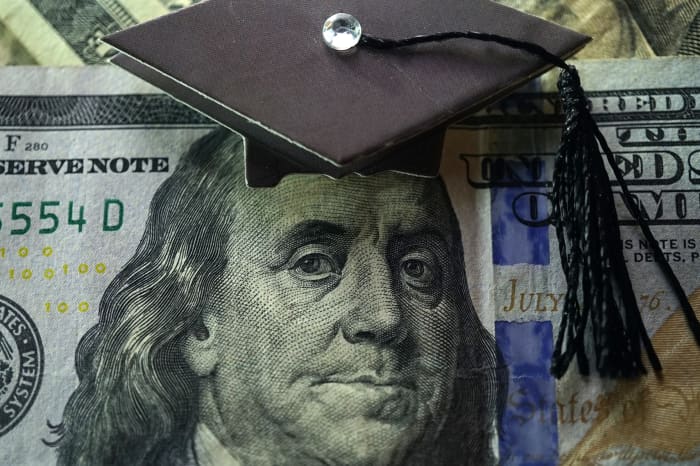‘My younger classmates got great jobs. I got a bankruptcy.’ I graduated college at 40, but I’m jobless and have defaulted on my student loans. How can I deal with this debt?

How to get out of student loan debt
Getty Images/iStockphoto
Question: I am about to turn 65 and eligible for Medicare. I have a bachelor’s degree in business and organizational communications and an associates degree in marketing and sales technology. I was 40 when I graduated. My younger classmates got great jobs. I got a bankruptcy, and my home and cars repossessed. All of my questionable choices and ignorance have been staring at me since 1997. I’ve sometimes paid my loans — actually more often than not I have — but I defaulted several times. Many times I filed hardship forbearance. My loans have all been consolidated and passed through several companies. As of late, I qualified for $0 payment through income-based repayment. The interest accumulated is more than double what I borrowed. COVID put me out of work. What can I possibly do in this situation?
Answer: First of all, let’s look at what you’re doing right, which is getting on an income-driven repayment plan. When you have a spotty repayment history that includes defaults, forbearances, consolidation and multiple repayment plans, your best option is to find a plan that will adjust to your life circumstances, says Anna Helhoski, student loan expert at NerdWallet. “Income-driven repayment is the best option when you have fluctuations in income.” (Note that these income-driven repayment plans are typically only available for federal loans, so you likely don’t want to refinance, as that would strip you of this option. But for readers with private loans, however, a refinance might make sense as rates are low now — you can see the lowest rates you might qualify for here.)
“What you’ll need to do is recertify your income every time it changes. This can be a tedious and onerous process to do more than once per year, but it is likely the best option to make sure you stay on track and out of default,” says Helhoski, of staying on an income-driven repayment plan. Under these repayment plans, any remaining balance is forgiven if your federal student loans aren’t fully repaid at the end of the plan, so long as you’ve made the minimum number of consecutive payments, which is 20 years or 25 years on an income-based repayment plan, you’re in good shape. For those with very low incomes, payments may be as low as $0 per month and still count towards loan forgiveness.
Have a question about getting out of student loan or other debt? Email [email protected].
It seems that your student loans did not get discharged when you filed for bankruptcy — it’s very hard to get them discharged, pros say — and to do so requires demonstrating undue hardship in an adversarial proceeding. “Undue hardship is generally interpreted as meaning that you are currently unable to repay your student loans and maintain a minimal standard of living for yourself and your dependents, that this situation must be likely to persist for most of the life of the loans and that you’ve made a good faith effort to explore repayment options like income-driven repayment, deferments and forbearances,” says student loan expert Mark Kantrowitz, author of Who Graduates From College? Who Doesn’t?.
It’s essential now that you get a hold of your finances. “It’s not an overnight process,” says Grace Yung, a certified financial planner at Midtown Financial. “In order to recover from bankruptcy and to work your way out of debt and toward financial freedom, it [requires a] change in your financial habits.” The National Foundation for Credit Counseling and Clearpoint offer free or low cost credit counseling services to help people navigate personal financial issues.
And you’ll want to find a job if you can. Depending on what state you’re in, there are likely employment development programs, which have special services for older workers. RetirementJobs.com offers job listings for people over age 50, and AARP has a job board geared to helping older workers find work.
The hard work comes into play when you have to stay disciplined and need to implement new, healthy habits. “It will have to become your new way of life so that you can stay financially fit,” says Yung.




